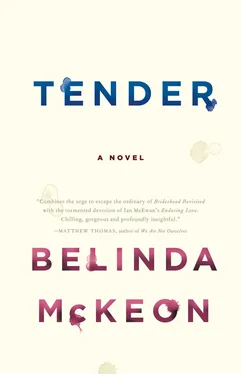The sound of the front door had startled her; she had been so caught up in obsessing over where he had gone that she had not considered the possibility that he might not, after all, have gone anywhere, or that he might be coming back. She had rushed to the hall door to meet him, and when she had thrown her arms around him, he had laughed, letting her hug him a moment but then holding her back from him with a look of bafflement on his face; he had only gone to the shop to buy breakfast things, but because it was so early the nearest shop had been closed, so he had walked to the next one, and that had been closed too, and the one he had found had been close to town, and what was she talking about, she thought he had gone?
She had laughed about it too, after a while, and at the breakfast table Amy and Lorraine and Cillian had laughed, and everyone had teased her, and she knew it was a story she would be teased about for ages; but at the same time, in James’s eyes, she had seen something that was not laughter. Something that was not the enjoyment of how silly she had been, and how melodramatic. It had not been a coldness; that was too strong. He was still James, he was still right beside her, draping his arms around her every couple of minutes, still saying her name with that rich, layered affection. But it had been a change. There had been something — a carefulness — in the way he had looked at her. A decision, it seemed to her, about how he was going to be with her from now on, and about how he was going to be with, and for himself.
And it had driven her mad.
That was the only way she could see this, this thing that had happened to her over the last ten days: a madness. James had done exactly what Catherine had wanted him to do — he had stopped crowding her, stopped needing to be with her, beside her, every single minute — and she had reacted by becoming exactly as he had been. By clinging. Craving his company. Demanding it. For quite a few days now, the coffee breaks, the lunch breaks, the trips to the galleries, the long walks, had not been James’s idea. The irony was — everything was irony now, it seemed to Catherine — James had found it difficult to get away to do these things with her, because James had other things on now — he had got himself work in O’Brien’s, a pub near Christchurch, three evenings a week and two afternoons, and he was beginning, on top of that, to take his photographs, to put together the series he had talked to her about that afternoon — which now seemed so, so long ago — of the ID cards. He was approaching people in the street and asking if he could photograph them; he had also started to photograph some of the people Catherine had introduced him to in college. He was in the darkroom any chance he got, making prints, and Catherine had seen them all, and they were brilliant; they were wonderful — stark and strange and disorienting. They did not look like the ID card photographs — they were much more beautiful than that — but they had the same sense of people being caught in their unguarded moments, accessed in the pureness and vulnerability of who they really were: a man in construction gear, his gaze sliding warily to the side, an old woman in an apron, her hands clasped in front of her, her eyes closed, a boy their age — a boy who was cute, which should have been a source of pleasure to Catherine but felt instead like a scourge — in a football shirt, leaning back against a car, glaring at a point in the middle distance.
And no, James had not yet taken Catherine’s photograph, but she was determined that this would happen over the coming weekend.
And this was part of what had changed, too: Catherine being determined that James would act, and act towards her, in certain crucial ways. That he would come with her when she wanted him to go for coffee or to the National Gallery, for instance, or to O’Donoghue’s for an early-evening pint, even if he was working in another pub himself later and said he would prefer not to arrive there with booze on his breath; that he would walk with her on St. Stephen’s Green or along the canal; that he would, now, take her photograph.
He was bemused by it, Catherine thought. He did not seem to see it the way she did, as something to worry over, as something about which she should feel ashamed; those ways of seeing it, she suspected, would never even have occurred to him. For his part, the things he had told her that night in the kitchen, the experience of telling them, had seemed, to some extent, to have lightened the load he was carrying, to have freed him up in some way. He was up early in the mornings now, and unless she was quick about getting up herself, and getting ready, he was often out the door before she was, and it could be difficult to track him down during the day. On the evenings he was not working in the pub, he was mostly at home with her and the others in Baggot Street, but one evening he had wanted to go for a drink with Zoe and Aidan and Aidan’s friend Liam, and Catherine, who had only wanted to stay in and watch television in front of the fire with him, had not been able to leave him to it; she had trailed along, and had not been very good company — Zoe, the next day, had made a comment about PMS.
He was going from her; that was how she kept thinking of it. He had made the decision, because of what she had said to him that night, or because of what she had forced him to face up to that day, to pull away from her slightly, to carve out his own space, to start living his own life. And Catherine could not understand where these feelings were coming from; she could not understand why they had such a hold over her, gripping her by the hair it seemed sometimes, clasping her by the throat — but she felt them. She felt alone; or she felt, at least, the threat, the specter, of her own aloneness. She felt the panic of his going, and the emptiness with which it would leave her. He was not going anywhere, and yet she felt it. And there were no letters now; there were no fat white skins bulging with words through which to feel close to him, through which to feel that there was someone, out there, always, listening to her. There was only him, and there was only the distance from him to her. And Catherine was scrabbling across it now. Catherine was thrashing in it as though it was drowning her. And there was, too, the fact of what was happening to her body, now, when James put his arms around her, when James put his lips to her forehead, his lips to her cheek — but Catherine did not want to think about that part of it anymore. Catherine did not want to think about the second night, the previous week, that Cillian had stayed over, so that he and Lorraine had once again sequestered the sitting-room floor; Catherine did not want to think of her own gladness that night, or of what it had felt like to have James once more in the bed beside her, or what it had felt like to drift off and to awaken with him nestled so close.
There were things it was not good to think about. There were questions it was not useful to ask.
James was finished in the darkroom, as it turned out, when Catherine went up to find him; he was in the PhotoSoc office, chatting intently with a girl holding some kind of old-fashioned, box-shaped camera. If he was surprised to see her arrive, he did not show it; he just beckoned her over, and began telling her about the girl’s camera, which had belonged to her grandfather, and which was, he said, a Rolleiflex, the camera that Richard Avedon had used, and Diane Arbus, and Robert Capa. He mentioned some other photographers of whom Catherine had not heard, and the girl beside him nodded enthusiastically and added some more names. Catherine glanced at her. She was plump and short, with blond curls; she held the camera below her large breasts. Her fingernails were painted a glittery purple. James introduced her, but Catherine instantly forgot her name; all she could think about was how keenly she wanted to get James away, and home, and to herself. But he kept talking, as was usual; now he was explaining the workings of the camera, how you had to look down through it from above, as though through a tiny trapdoor, and at this, the blond girl demonstrated and then, smiling, looped the leather strap from around her neck and passed the camera over to Catherine to try for herself.
Читать дальше












